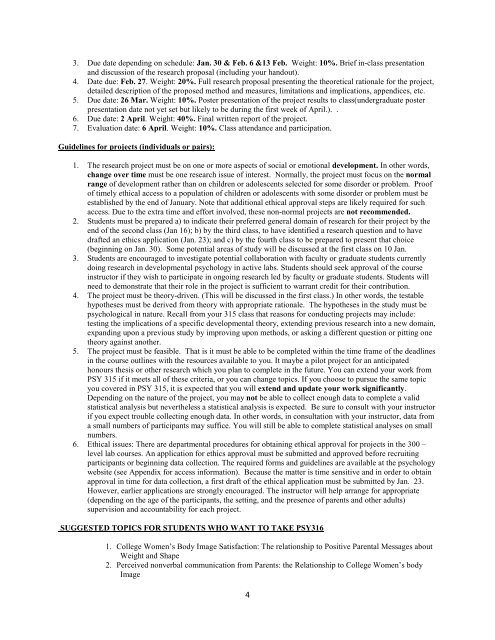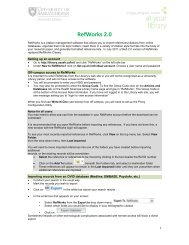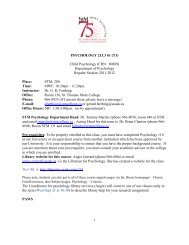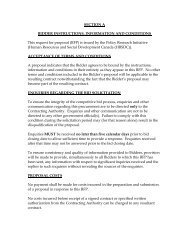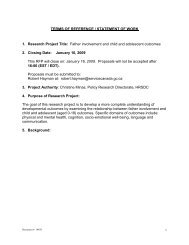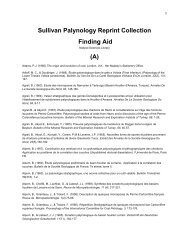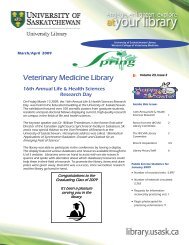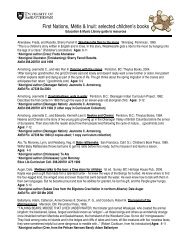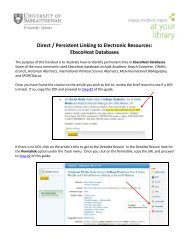St. Thomas More College, University of Saskatchewan Department ...
St. Thomas More College, University of Saskatchewan Department ...
St. Thomas More College, University of Saskatchewan Department ...
You also want an ePaper? Increase the reach of your titles
YUMPU automatically turns print PDFs into web optimized ePapers that Google loves.
3. Due date depending on schedule: Jan. 30 & Feb. 6 &13 Feb. Weight: 10%. Brief in-class presentation<br />
and discussion <strong>of</strong> the research proposal (including your handout).<br />
4. Date due: Feb. 27. Weight: 20%. Full research proposal presenting the theoretical rationale for the project,<br />
detailed description <strong>of</strong> the proposed method and measures, limitations and implications, appendices, etc.<br />
5. Due date: 26 Mar. Weight: 10%. Poster presentation <strong>of</strong> the project results to class(undergraduate poster<br />
presentation date not yet set but likely to be during the first week <strong>of</strong> April.). .<br />
6. Due date: 2 April. Weight: 40%. Final written report <strong>of</strong> the project.<br />
7. Evaluation date: 6 April. Weight: 10%. Class attendance and participation.<br />
Guidelines for projects (individuals or pairs):<br />
1. The research project must be on one or more aspects <strong>of</strong> social or emotional development. In other words,<br />
change over time must be one research issue <strong>of</strong> interest. Normally, the project must focus on the normal<br />
range <strong>of</strong> development rather than on children or adolescents selected for some disorder or problem. Pro<strong>of</strong><br />
<strong>of</strong> timely ethical access to a population <strong>of</strong> children or adolescents with some disorder or problem must be<br />
established by the end <strong>of</strong> January. Note that additional ethical approval steps are likely required for such<br />
access. Due to the extra time and effort involved, these non-normal projects are not recommended.<br />
2. <strong>St</strong>udents must be prepared a) to indicate their preferred general domain <strong>of</strong> research for their project by the<br />
end <strong>of</strong> the second class (Jan 16); b) by the third class, to have identified a research question and to have<br />
drafted an ethics application (Jan. 23); and c) by the fourth class to be prepared to present that choice<br />
(beginning on Jan. 30). Some potential areas <strong>of</strong> study will be discussed at the first class on 10 Jan.<br />
3. <strong>St</strong>udents are encouraged to investigate potential collaboration with faculty or graduate students currently<br />
doing research in developmental psychology in active labs. <strong>St</strong>udents should seek approval <strong>of</strong> the course<br />
instructor if they wish to participate in ongoing research led by faculty or graduate students. <strong>St</strong>udents will<br />
need to demonstrate that their role in the project is sufficient to warrant credit for their contribution.<br />
4. The project must be theory-driven. (This will be discussed in the first class.) In other words, the testable<br />
hypotheses must be derived from theory with appropriate rationale. The hypotheses in the study must be<br />
psychological in nature. Recall from your 315 class that reasons for conducting projects may include:<br />
testing the implications <strong>of</strong> a specific developmental theory, extending previous research into a new domain,<br />
expanding upon a previous study by improving upon methods, or asking a different question or pitting one<br />
theory against another.<br />
5. The project must be feasible. That is it must be able to be completed within the time frame <strong>of</strong> the deadlines<br />
in the course outlines with the resources available to you. It maybe a pilot project for an anticipated<br />
honours thesis or other research which you plan to complete in the future. You can extend your work from<br />
PSY 315 if it meets all <strong>of</strong> these criteria, or you can change topics. If you choose to pursue the same topic<br />
you covered in PSY 315, it is expected that you will extend and update your work significantly.<br />
Depending on the nature <strong>of</strong> the project, you may not be able to collect enough data to complete a valid<br />
statistical analysis but nevertheless a statistical analysis is expected. Be sure to consult with your instructor<br />
if you expect trouble collecting enough data. In other words, in consultation with your instructor, data from<br />
a small numbers <strong>of</strong> participants may suffice. You will still be able to complete statistical analyses on small<br />
numbers.<br />
6. Ethical issues: There are departmental procedures for obtaining ethical approval for projects in the 300 –<br />
level lab courses. An application for ethics approval must be submitted and approved before recruiting<br />
participants or beginning data collection. The required forms and guidelines are available at the psychology<br />
website (see Appendix for access information). Because the matter is time sensitive and in order to obtain<br />
approval in time for data collection, a first draft <strong>of</strong> the ethical application must be submitted by Jan. 23.<br />
However, earlier applications are strongly encouraged. The instructor will help arrange for appropriate<br />
(depending on the age <strong>of</strong> the participants, the setting, and the presence <strong>of</strong> parents and other adults)<br />
supervision and accountability for each project.<br />
SUGGESTED TOPICS FOR STUDENTS WHO WANT TO TAKE PSY316<br />
1. <strong>College</strong> Women’s Body Image Satisfaction: The relationship to Positive Parental Messages about<br />
Weight and Shape<br />
2. Perceived nonverbal communication from Parents: the Relationship to <strong>College</strong> Women’s body<br />
Image<br />
4


